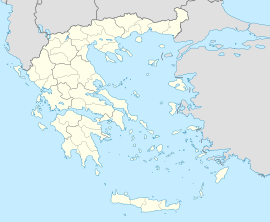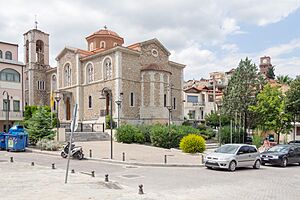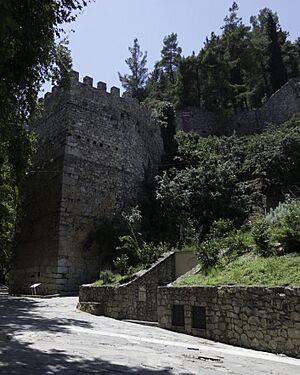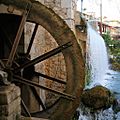Livadeia facts for kids
Quick facts for kids
Livadeia
Λιβαδειά
|
|
|---|---|
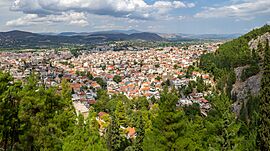
General view from the castle
|
|
| Country | Greece |
| Administrative region | Central Greece |
| Regional unit | Boeotia |
| Area | |
| • Municipality | 694.016 km2 (267.961 sq mi) |
| • Municipal unit | 166.691 km2 (64.360 sq mi) |
| Elevation | 200 m (700 ft) |
| Population
(2021)
|
|
| • Municipality | 29,379 |
| • Municipality density | 42.3319/km2 (109.6391/sq mi) |
| • Municipal unit | 22,547 |
| • Municipal unit density | 135.262/km2 (350.328/sq mi) |
| Community | |
| • Population | 22,113 (2021) |
| • Area (km2) | 139.614 |
| Time zone | UTC+2 (EET) |
| • Summer (DST) | UTC+3 (EEST) |
| Postal code |
321 00
|
| Area code(s) | 22610 |
| Vehicle registration | ΒΙ |
| Website | www.livadia.gr |
Livadeia (Greek: Λιβαδειά Livadiá) is a town located in the middle of Greece. It is the main city of the Boeotia region. Livadeia is about 90 kilometers (56 miles) north-west of Athens. It is also 64 kilometers (40 miles) west of Chalkida.
The area around Livadeia has many mountains. Farming mostly happens in the valleys. People there have long grown cotton, tobacco, and grains. They also raise animals. Livadeia is also famous for being part of the Trojan War. It fought alongside Mycenae.
Livadeia is home to Levadiakos F.C., a football team that plays in Greece's top league.
Contents
Geography and Area
The entire area of Livadeia municipality is about 694 square kilometers (268 square miles). The main part of Livadeia, called the municipal unit, covers about 167 square kilometers (64 square miles). The community of Livadeia itself is about 140 square kilometers (54 square miles).
Local Government
The municipality of Livadeia was created in 2011. This happened when five smaller municipalities joined together. These five areas became parts of the larger Livadeia municipality. The former municipalities were:
- Chaironeia
- Davleia
- Koroneia
- Kyriaki
- Livadeia
Population Changes Over Time
The number of people living in Livadeia has changed over the years. Here is a look at the population:
| Year | Town | Municipal unit | Municipality |
|---|---|---|---|
| 1991 | 23,295 | - | 28,110 |
| 2001 | 24,061 | 24,769 | 29,995 |
| 2011 | 26,193 | 26,779 | 31,315 |
| 2021 | 22,113 | 22,547 | 29,379 |
Many people living in Livadeia are Arvanites. This is a group of people who traditionally speak a dialect of Albanian.
History of Livadeia
In ancient times, Livadeia was known as Lebadeia. It was a town near the western border of ancient Boeotia. The ancient town was built at the bottom of a steep hill. This hill was part of Mount Helicon.
Pausanias, an ancient Greek writer, said that the area was first home to a city called Mideia. Later, people from Mideia moved to the plain. They founded a new city named after their leader, Lebadus. Other ancient writers believed that Mideia and another city, Arne, were covered by Lake Copais.
The Famous Oracle
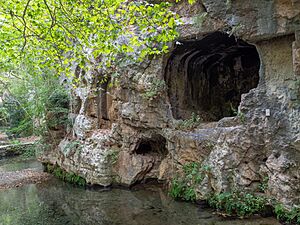
Lebadeia was not very important at first. But it became famous because of its special oracle of Trophonius. An oracle was a place where people believed they could get advice from the gods. Important leaders like Croesus and Mardonius visited this oracle. It was still used even when other oracles in Boeotia were no longer active. Pausanias himself visited the oracle. He wrote that Lebadeia was the most successful place in Boeotia during his time.
Even though the oracle was sacred, Lebadeia was still attacked in wars. It was captured and robbed by Lysander and Archelaus. During a war against Perseus of Macedon, Lebadeia supported the Romans. Other cities in the region supported the Macedonian king.
Ancient Temples and Buildings
When Pausanias visited Lebadeia in the 2nd century AD, he saw many temples. The most important place was the temple of Trophonius. It had a statue of the hero made by Praxiteles. There was also a temple for Demeter, a goddess of harvest. An outdoor statue of Zeus (the king of the gods) was also there. Higher up on the mountain was the oracle itself.
Even higher up was a hunting area for Persephone, a goddess of the underworld. There was also a large, unfinished temple for Zeus Basileus. Other temples housed statues of Apollo, Cronus, and Hera. Pausanias also mentioned a small chapel. People who wanted to ask the oracle for advice would spend a few days there first.
Later Periods
During the Byzantine period, Livadeia became less important. However, in the 9th century, its economy grew a bit. During the time when Franks ruled parts of Greece, Livadeia became important again. In the 14th century, it was controlled by the Catalan Company.
The Ottoman Empire took control in 1458. They gave special rights to the people living there. This helped the city's businesses and trade. Livadeia finally became free from the Ottomans in the 1820s. This happened during the Greek War of Independence.
Ancient Remains
Pausanias wrote that the city's first name was Mideia. He said it was renamed Lebadeia after Lebados from Athens. Lebados moved the city from high ground to its current spot. This is on the banks of the Herkyna river.
The city's special protector was the hero/god Trophonios. His oracle was famous far beyond Greece. To consult it, people had to go into an underground room. Near the springs of the Herkyna river, there are small caves. These caves have niches and marble pieces. People believe this was the site of the oracle.
On the hill above, there is a small medieval castle. Most of it was built by the Catalan Company in the 14th century. You can reach it by walking. This is one of only four Catalan castles in Greece.
Further west, on the hill of Profitis Ilias, are the remains of a large temple. This was a temple of Zeus Basileus. It might have been started in the 3rd century BC but was never finished.
The main church, St. George's Cathedral, has an important item. It is a head of St. George. This was taken to Venice in the 15th century. But it was returned to Livadeia in 1999 as a sign of friendship. In medieval times, the river had many water mills. One of these mills is still preserved today.
Transportation
The closest train station is Livadeia station. It is about 5 kilometers (3 miles) away from the city center.
Sports in Livadeia
Livadeia has two sports clubs that play in national leagues. Levadiakos F.C. is a football (soccer) club. Livadeia B.C. (A.E. Livadeias) is a basketball club.
| Sport clubs based in Livadeia | |||
|---|---|---|---|
| Club | Founded | Sports | Achievements |
| Levadiakos F.C. | 1961 | Football | Plays in Super League |
| Livadeia B.C. | 1994 | Basketball | Plays in A2 Ethniki |
Famous People from Livadeia
- Antonios Georgantas, a revolutionary and politician
- Kostas Hatzis, a musician
- Dimitrios Ioannou, a military officer
- Lambros Katsonis, a revolutionary
- Petros Kokkalis, a medical doctor and politician
- Panos Koutrouboussis, a writer and artist
- Mary Tsoni, an actress and musician
Sister City
Livadeia has one sister city:
- Livadiya, Crimea
Gallery
See also
 In Spanish: Lebadea para niños
In Spanish: Lebadea para niños


